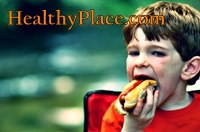The Link Between ADHD and Eating Disorders
Many with ADHD have co-occurring Eating Disorders such as sugar craving, compulsive overeating, anorexia and bulimia. Find out why.
SELF-MEDICATING WITH FOOD
 As human beings we find creative ways to decrease our emotional, physical, and spiritual pain. Some people use alcohol and other drugs to ease the pain and frustration of their ADD symptoms. Others use compulsive behaviors such as gambling, spending, or sexual addictions. Eating in ways that are not good for us, but temporarily make us feel better is also a form of self-medicating. Self-medicating is when we use substances and behaviors to change how we feel. The problem with self-medicating is that it initially works, but soon leads to a host of new problems.
As human beings we find creative ways to decrease our emotional, physical, and spiritual pain. Some people use alcohol and other drugs to ease the pain and frustration of their ADD symptoms. Others use compulsive behaviors such as gambling, spending, or sexual addictions. Eating in ways that are not good for us, but temporarily make us feel better is also a form of self-medicating. Self-medicating is when we use substances and behaviors to change how we feel. The problem with self-medicating is that it initially works, but soon leads to a host of new problems.
Eating can temporarily calm ADD physical and mental restlessness. Eating can be grounding for some people with ADD, helping them focus better while reading, studying, watching television or movies. If your brain is not quick to contain your impulses, you may eat without thinking. Some compulsive overeaters are shocked to realize they have finished a carton of ice cream or a king-size tub of theater popcorn. They were not consciously aware of how much they were eating. Eating puts them into a pleasant trance like state that is a respite from their often active and chaotic ADD brain.
Although we don't think of food as a drug, it can be used as one. We have to eat, but eating too much or too little of certain types of food has consequences. Since there is no way to totally abstain from food, eating disorders are extremely hard to recover from. You may have to abstain from certain foods, perhaps those containing sugar, because they trigger a compulsion for more, yet everywhere you look you see and smell these foods.
WHY FOOD?
Food is legal. It is a culturally acceptable way to comfort ourselves. For some people with ADD, food is the first substance that helped them feel calm. Children with ADD will often seek out foods rich with sugar and refined carbohydrates such as candy, cookies, cakes, and pasta. People who compulsively overeat, binge, or binge and purge also eat these types of foods.
It is no accident that binge food is usually high in sugars and carbohydrates, especially when you take into consideration how the ADD brain is slow to absorb glucose. One of the Zametkin PET scan studies, results indicated that "Global cerebral glucose metabolism was 8.1 percent lower in the adults with hyperactivity than in the normal controls..."1 Other research has also confirmed slower glucose metabolism in ADD adults with and without hyperactivity. This suggests that the binge eater is using these foods to change his or her neurochemistry.
SUGAR CRAVING AND HYPERACTIVITY
Researchers have searched for the connection between sugar and hyperactivity. Some studies have reported that sugar causes hyperactivity in children. When these studies have been duplicated, however, the results were not always consistent. The idea that sugar causes hyperactivity is relatively new in our culture, and has not been passed on from previous generations. This is why grandparents are often miffed when they are told not to give their grandchild any sugar. They haven't had the experience of sugar causing hyperactivity.
What if we have been looking at the question backward? What if ADD hyperactivity actually causes people to crave sweets? If the ADD brain is slower to absorb glucose, it would make sense the body would find a way to increase the supply of glucose to the brain as quickly as possible.
I have worked with many ADD adults who are addicted to sugar, especially chocolate which also contains caffeine. They find that eating sugar helps them stay alert, calm, and focused. Prior to ADD treatment many report drinking 6-12 sugar sodas, several cups of coffee with sugar, and constantly nibbling on candy and sweets throughout the day. It is impossible to sort out what is pure sugar craving when it is mixed with the stimulating effects of caffeine on the ADD brain.
THE SEROTONIN CONNECTION
Serotonin is a neurotransmitter that has been associated with symptoms of depression. Serotonin helps regulate sleep, sexual energy, mood, impulses and appetite. Low levels of serotonin can cause us to feel irritable, anxious, and depressed. One way to temporarily increase our serotonin level is to eat foods that are high in sugar and carbohydrates. Our attempts to change our neurochemistry are short lived, however, and we have to eat more and more to maintain feeling of well being. Medications such as Prozac, Paxil and Zoloft work to regulate serotonin. These medications are frequently helpful when used in combination with ADD and eating disorder treatment. Proper levels of serotonin can also help improve impulse control giving the person time to think before they eat.
COMPULSIVE OVEREATING
Most of us overeat at times. We may eat for sheer enjoyment even if we're not hungry, or we may eat more than we intend at a dinner party or celebration. But for some, overeating becomes a compulsion they cannot stop. Compulsive overeaters lose control of their ability to stop eating. They use food to alter their feelings rather than satisfy hunger. Compulsive overeaters tend to crave foods high in carbohydrates, sugars, and salt.
BINGE EATING and ADHD
Binge eating differs from compulsive overeating in that the binge eater enjoys the rush and stimulation of planning the binge. Buying the food and finding the time and place to binge in secret creates a level of risk and excitement that the ADHD brain craves. Large amounts of foods high in carbohydrates and sugars are rapidly consumed in a short period of time. The binge itself may only last fifteen to twenty minutes. Proper levels of serotonin and dopamine aid in impulse control problems that contribute to binge eating and Bulimia.
BULIMIA
Bulimia is binge eating accompanied by purging. The bulimic experiences the rush of planning the binge, which can be very stimulating for the person with ADD. In addition, the bulimic may be stimulated by the satiation binging provides; then, he or she adds an additional dimension to the process: the relief of purging. Many bulimics report entering an altered state of consciousness, experiencing feelings of calmness and euphoria after they vomit. This cleansing provides relief which is short lived, and so the bulimic is soon binging again.
ANOREXIA
Our culture is obsessed with thinness. "Food is OK, but, don't gain weight." No wonder so many adolescent boys and girls, as well as women and men, become imprisoned in binge and purge cycles, chronic dieting, and anorexia nervosa. Anorexia can be deadly. Anorectics have lost their ability to eat in a healthy way. Self-starvation is characterized by loss of control. They are obsessed with thoughts of food, body image, and diet. Anorectics can also use laxatives, diuretics, enemas, and compulsive exercise to maintain their distorted image of thinness.
As we learn more about ADD, we discover that people manifest ADD traits differently. Obsessing on food, exercise, and thinness gives the anorectic a way to focus their chaotic ADD brains. They become over focused on thoughts and behaviors that related to food.
Frequently these people will only become aware of their high level of activity, distractibility, and impulsiveness after they have been in recovery for anorexia. Self starvation curtails hyperactivity.
Distractibility and spaceyness are characteristics of both anorexia and bulimia, whether or not they're accompanied by ADD. In each case the inability to concentrate or focus results because the brain is not being properly nourished. For people with ADD, however, there is a history of attention difficulties that predates the eating disorder. Their concentration, impulse problems, and activity level may not improve when their eating disorder is treated. As a matter of fact, their ADD traits can get worse once they are no longer self-medicating with food, or organizing their lives around food and exercise. If you are someone who has struggled with eating disorders, and suspect you may have ADD, it is important to get an evaluation. Both your eating disorders and your ADD must be treated.
COMPREHENSIVE TREATMENT
It is essential that both ADHD and eating disorders are treated. Too many people are struggling with their eating disorders because they have undiagnosed or untreated ADD. When ADD is properly treated the individual is better able to focus and follow through with treatment for their eating disorders. They also have greater control of their impulses, and less of a need to self-medicate their ADD symptoms.
Stimulant medications such as Dexedrine, Ritalin, Desoxyn, and Adderall that work with the neurotransmitter dopamine can be helpful in treating ADD restlessness, impulsiveness, attentional problems, and problems with obsessive thoughts. Medications such as Paxil, Prozac, and Zoloft are useful because they increase serotonin levels, thus helping with impulse control, obsessive thoughts, and decrease agitation.
The key to successful treatment lies in a comprehensive treatment program that address the medical, emotional, social, and physical aspects of both ADD and eating disorders. Recovering from eating disorders takes time, hard work and commitment. Recovering from eating disorders when you have ADD is even tougher. I encourage you to be patient. Put away the whip of contempt, and have compassion for yourself. You've been through a lot. Over the years I have seen many people who were once hopeless and despondent because they could not recover from their eating disorders chart solid courses of recovery once their ADD was treated.
1. Zametkin, Nordahl, Gross, King, Semple, Rumsey, Hamburger, and Cohen, "Cerebral Glucose Metabolism in Adults with Hyperactivity of Childhood Onset," , 30 (1990).
About the author: Wendy Richardson, MA., LMFT, the author of The Link Between ADD And Addiction: Getting The Help You Deserve, is a licensed marriage, family, child therapist and Certified Addiction Specialist in private practice. She is also a consultant, trainer, and speaks at national and international ADD, chemical dependency, and learning disability conferences.
next: Natural Alternatives: Low Phosphate Diet, Magnets For Treating ADHD
~ back to adders.org homepage
~ adhd library articles
~ all add/adhd articles
APA Reference
Staff, H.
(2008, December 19). The Link Between ADHD and Eating Disorders, HealthyPlace. Retrieved
on 2026, January 13 from https://www.healthyplace.com/adhd/articles/link-between-adhd-and-eating-disorders

